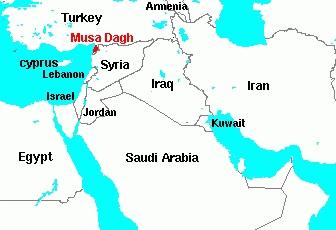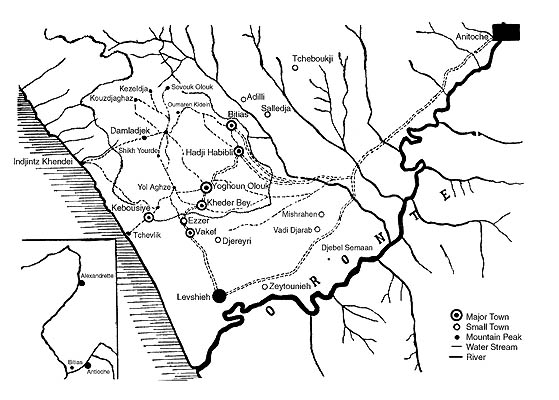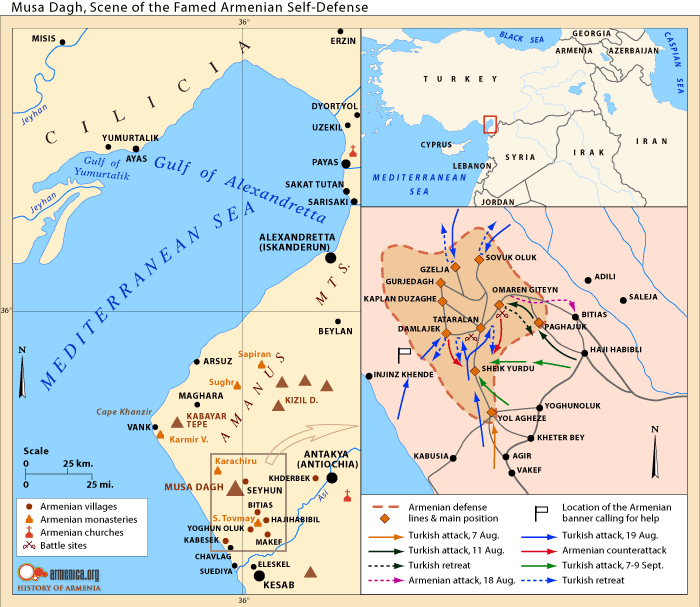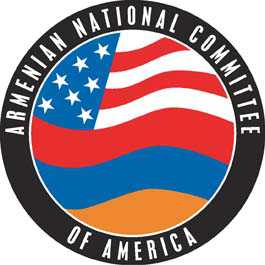
For many Armenians, “Musa Dagh” is a symbol of resistance against extermination by the Turks. Popularized by Franz Werfel’s 1933 book entitled “The Forty Days of Musa Dagh,” the battle is portrayed as the flight and struggle of the Armenian population of six villages, allegedly poorly armed and with few provisions,

against the onslaught of the Ottoman army, trying to implement the relocation orders that so many Armenians equate to genocide. After holding out for 53 days, roughly 4,000 Armenians were transported by five Allied warships to Egypt, where they stayed in refugee camps until the end of World War I, before finally returning to their homes in Hatay.
When the French relinquished control of Hatay to Turkey in 1939, many of these Armenians, by their own free will, chose to immigrate to other countries. According to the residents of the last of the Armenian villages near Musa Dagh, the village of Vakifli [1], those who chose to migrate were primarily “right-wing”, while those who stayed were “left-wing” and trusted Turkey’s new leader, Mustafa Kemal Ataturk [2].
As might be expected, Turkish accounts of the Battle of Musa Dagh are quite different. According to the Turkish Governor of Halep at the time, General Fahrettin Turkkan, the Armenians living around Musa Dagh had reports that the Allies intended to land forces in the region of Iskenderun, and thus decided to stop paying the taxes they owed the Ottoman government, ascending to the top of Musa Dagh in rebellion. Officials from the government were sent to warn and advise these Armenians to pay their taxes, but instead they were welcomed with gunfire. Left without any other choice but to confront these rebels, the local Jandarma commander, Colonel Galip, climbed with his forces to the top of Musa Dag, but was surprised to find that the Armenians had evacuated the region. Upon examination, it was found that the Armenians had gone towards the Mediterranean, boarding a French warship. There were no bodies, no wounded, no sick people found at all. Just 20-30 slaughtered animals. [3]
Another perspective on the Battle of Musa Dagh is given by Albert Amateau, a Sephardic Jew born and raised in Milas, Turkey, who in a signed, notarized deposition dating October 11, 1989, offered the following account:
“Fifty thousand Armenians, all armed, ascended the summit of that mountain after provisioning it to stand siege. Daily sallies from that summit of armed bands attacked the rear of the Ottoman armies, and disappeared into the mountain. When the Ottomans finally discovered the fortification the Armenians had prepared, they could not assault and invade it. It stood siege for 40 days, which is a good indication of the preparations the Armenians had made surreptitiously under the very nose of the Ottoman Government. Nor was it ever explained that the rebellion of the Armenians had been fostered, organized, financed, and supplied with arms and munitions by the Russians.”
This description is supported by Edward J. Erickson, who in his book “Ordered to Die: A History of the Ottoman Army in the First World War”, wrote that there was strong fighting for forty days in Musa Dagh. All this raises several important questions about the Armenian version of events. For example, if the Armenians were truly poorly armed, and fled the mountain without much planning to avoid relocation, then how did they hold out so long? Furthermore, Musa Dagh is just one speck on Turkey’s very long Mediterranean coastline. Isn’t it just a bit too coincidental that a French warship just “happened” to be passing by at the right time to miraculously discover the Armenians on Musa Dagh and rescue them?
Regardless of whether the Armenians of Musa Dagh were in cahoots with the French or not, which ever way you look at it, the fact remains that the Armenians of Musa Dagh chose to rebel, they chose to fight the Ottoman army, they chose to resist the eviction order. Relocation is NOT tantamount to genocide, although clearly something undesirable from an Armenian perspective. I can understand why they’d want to resist leaving their homes. However, any losses incurred during the fighting cannot even be termed even a massacre because the Armenians were armed and willingly engaged the Ottoman army.
Furthermore, even if you accept the Armenian explanation that at they ascended Musa Dagh to flee relocation, that the revolt was provoked by the Ottomans, this can hardly be viewed as characteristic of Armenian revolts during that time. It is well documented that Armenian rebellions began in 1914, the year prior to the May 1915 relocation decree. In fact, dispatches even detail the names of Turks who were attacked, murdered or raped by Armenian militias [4]. A detailed analysis of the rebellion in Van, which triggered the relocation decision, is given by Justin McCarthy in his recent book entitled “The Armenian Rebellion at Van.”
Which brings me to my first question: why is Werfel’s book so precious to Armenians? Why would a film based on the battle be so detrimental to the image of Turks, and so useful in advancing Armenian allegations of genocide?
Unfortunately, Werfel’s book did not just dramatize the Battle of Musa Dagh, but interjected accusations and dialogue directly accusing the Ottoman regime of planning to systematically exterminate the entire Armenian population. In Werfel’s fiction, the deportation order was merely a cover for genocidal intentions.
For example, in his book, Werfel writes: “The same forthright and stumpy fingers (of Talaat Pasha) had composed that order sent out to the walis and mutessarifs: The goal of these deportations is annihilation.” Here, Werfel is clearly referring to the Andonian Documents which allegedly contain telegrams sent by Talat Pasha that openly state his alleged intention to kill Armenians. In Document #1 of the Andonian papers, Talat Pasha allegedly wrote: “Of course the Government will give the necessary instructions about the necessary massacres to the Governors.” And in the next document states that by November 18, 1915, “It is the duty of all to effect on the broadest lines, the realization of the noble project of wiping out of the existence the Armenians…”
The problem with the Talat Pasha telegrams, however, is that these have been shown by Professors Sinasi Orel and Surreya Yuca to be forgeries! [5] In fact, Armenians have no proof that the Ottomans ever planned massacres. To the contrary, archives show that Ottoman soldiers were ordered to protect migrating Armenians, a fact corroborated by the statement of 105 year-old Armenian Yeghisapet Kesabyan of Lebanon: “We walked for days. Ottoman soldiers were always by our side to protect us so that no one would attack us.” [6]
Both Armenians and Turks were victims of inter-communal violence, hunger, starvation and disease during that time. The Ottoman archives document that over 500,000 Muslims perished at Armenian hands. All in all, an estimated 2.5 million Muslims were slaughtered during World War I. The British are on record for having told Armenian leaders, “You kill the Muslisms, and we will supply you with the arms and ammunition.” [7] For some reason, Europe chooses to ignore Turkish victims, and selectively mourn Armenians.
The next important question then, is on what sources did Werfel base his book?
Albert Amateau offers the following information about Franz Werfel, a fellow Jew who he knew personally:
“My friend, Franz Werfel, of Vienna, a writer, wrote a book entitled THE 40 DAYS AT MUSA DAGH, a history of the massacre of Armenians by the Ottoman Turks. The story was told to him by his friend, the Armenian Bishop of Vienna and Werfel never doubted the Bishop’s account. He did not investigate what he wrote. Years later, when the true facts about Musa Dagh were established by the research of neutral investigators – which was never denied by the Armenians – Werfel discovered that he had been duped by his friend, the Bishop, with a concocted story. Werfel confessed to me his shame and remorse for having written that story, in which he had blamed the Ottomans as the aggressors and terrorists.”
In his book, Werfel writes of how he got interested in the Armenian case: “This book was conceived in March of 1929, in the course of a stay in Damascus. The miserable sight of some maimed and famished-looking refugee children, working in a carpet factory gave me the final impulse to snatch from the Hades of all that was this incomprehensible destiny of the Armenian nation.”
Werfel goes on to state that he also used “historic records of a conversation between Enver Pasha and Pastor Johannes Lepsius” in reference to Lepsius’s book “Deutschland und Armenien.” From the sound of that statement, you might think that Lepsius was simply relaying information from Enver Pasha himself, but in fact much of what he wrote was based upon information provided by Armenian informants residing in Istanbul, and American Ambassador Morgenthaus (a man infamous for his racist anti-Turkish statements, who himself was primarily informed by Armenians). Lepsius himself never traveled into Anatolia, and obtained no first-hand information. [8]
Thus, the basic fact remains that Werfel had no direct knowledge of the Battle of Musa Dagh, never went to Turkey to investigate, or contact Turkish authorities to cross-check Armenian accounts, but merely regurgitated what he heard either directly or indirectly from Armenian sources.
Further complicating the reliability of “The Forty Days of Musa Dagh” as a source is that blatant historical mistakes were made, such as timing the Armenian revolt in Van as having taken place after the relocation orders, when in fact the rebellion began two months earlier in February 1915; and that in its translation from German into English, passages that could have been interpreted as favoring Turks were dropped. In his book, “The Myth of Terror”, Erich Feigl writes [9]:
“The Armenian circles that shorten and mutilate Werfel’s novel in the English edition know exactly why they must take these passages – in this particular case a whole page -~ out of the book. (There is, by the way, not one word to indicate that the novel has been altered in this fashion.) Today, there are a few scattered historical works in which anyone who is interested can find out about the true events and the sequence in which they occurred. In some libraries, one can even still find publications in which the Armenians boast of their war with the Ottomans, although these publications have now disappeared from nearly all libraries, and it has become truly difficult to find a magazine like Der Orient, put out by Johannes Lepsius.”
Why are Armenian accounts accepted by Europeans at face value?
Oral histories are never reliable sources because they are subject to human tampering. Stories can be exaggerated, one-sided, or even purposefully manipulated to demonize “the enemy.” As accounts are passed on from one person to the next, they also tend to be altered. I remember an exercise my middle school history teacher had us perform, in which she selected 10 students, telling one student a single sentence and asking him to pass it on to one of the other 10 students. Each time the sentence was passed on, the message bearer told it to the class, and we got to see first hand how even simple memory lapse could completely corrupt the message. Much of the hatred towards Turks has been instigated by horrific accounts by Armenian “survivors” – but how much is fact and how much is fiction, embellished for political purposes, is clearly up for debate.
Furthermore, doesn’t the fact that over the past 90 years Armenians have resorted to forgery, thievery, and terrorism to manipulate history and silence both the Turkish community and historians raise any alarm bells?
Sylvester Stallone has accused Turks of “killing” the “subject for 85 years.” Sly, we haven’t been “killing” anyone or anything. We’ve merely been pointing out the inconsistencies and inaccuracies with Armenian storytelling. Even in a court of law defendants are innocent until proven guilty. Surely the Turkish people deserve the chance to defend themselves, and not be hanged by 90 years of bad-press and contrary popular opinion.
Rather than criticizing Turks for defending themselves, both in World War I against European colonization and ethnic cleansing [10] and today, against false genocide accusations, perhaps you should think about the responsibilities actors have in remaining loyal to the truth.
If you are so concerning with Armenian history, perhaps you should try to become part of the solution, and act in support of proposals that could reconcile the Armenian and Turkish communities, such as Turkish Prime Minister Erdogan’s proposal for a joint historical research committee, or Ambassador Gunduz Aktan’s proposal for an open trial, in which the history could be debated and a final outcome reached.
The true epic tale here is not Musa Dagh, but the story of the Turkish Independence War, and how Turks overcame the armies of the British, French, Russians, Greeks and Armenians to establish the first modern, democratic republic in the Middle East.
Sevgi Zubeyde Gurbuz
[1] Adem Yavuz Arslan. “Son Ermeni Koyu: Vakifli” (The Last Armenian Village: Vakifli) Aksiyon Magazine, No. 555, July 25, 2005.
[2] Celal Baslangic, “Musa’dan Notlar” (Notes from Musa) Radikal Newspaper, July 29, 2002.
[3] Sakarya, Em.Tümg. İhsan-Belgelerle Ermeni Sorunu, Gnkur.Basımevi, Ankara 1984, s. 245-246, http://www.ermenisorunu.gen.tr/turkce/sorun/isyan13.html
[4] “Documents I,” Prime Ministry Directorate General of Press and Information.
[5] Turkkaya Ataov, “The Andonian ‘Documents’ Attributed to Talat Pasha are Forgeries”
An article summarizing the research in the book by Sinasi Orel and Surreya Yuca, “The Talat Pasha Telegrams: Historical Fact or Armenian Fiction?” London, 1986.
[6] Hasim Soylemez, “During Expulsion the Turkish Troops Protected Us From Attacks,” Zaman Newspaper, May 5, 2005.
[7] Mim Kemal Oke, “The Armenian Question”, pp. 180.
[8] Frank G. Weber cited in “The Armenian File” by Kamuran Gurun, pp. 221.
[9] Excerpt from the book “A Myth of Terror” by Erich Feigl.
[10] Stanford Shaw, “The Turkish War of National Liberation”, Turkish Historical Society, Ankara, 2000; and Justin McCarthy, “Death and Exile: The Ethnic Cleansing of Ottoman Muslims,” Darwin Press, March 1996.
TURKISH JOURNAL











